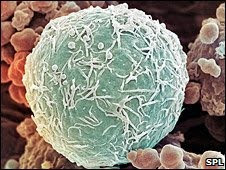 October 13 - Scientists have proved that it is possible for a mother's cancer cells to be passed to her unborn child.
October 13 - Scientists have proved that it is possible for a mother's cancer cells to be passed to her unborn child.
There are very rare cases where a mother and child appear to share the same cancer, but in theory the child's immune system should block the cancer. However, an analysis by a British-led team of one such case shows the cells which caused leukaemia in the child could only have come from the mother.
The study appears in Proceedings of the National Academy of Sciences. Whether it is possible for a mother to "infect" her unborn child with cancer have puzzled scientists for 100 years. In theory any cancer cells that manage to cross the placenta into the baby's bloodstream should be targeted for destruction by the child's immune system.
But there are records of 17 cases of a mother and baby appearing to share the same cancer - usually leukaemia or melanoma. The latest study focused on a Japanese woman and her baby, who both developed leukaemia.
The researchers used an advanced genetic fingerprinting technique to prove that the leukaemia cells found in the baby had originated from the mother. They showed that both patients' leukaemic cells carried an identical mutated cancer gene.
However, they also showed that the child had not inherited this gene from its mother - meaning it could not have developed this type of leukaemia in isolation.
No signature
Next, the researchers examined how the cancer cells could have neutralised the baby's immune system. They found that the cancer cells lacked some DNA which played a crucial role in giving them their own specific molecular identity. Without this telltale molecular sign, the child's immune system was unable to recognise the cells as foreign, and thus was not mobilised to attack them.
Lead researcher Professor Mel Greaves, of the Institute of Cancer Research , said: "It appears that in this and, we presume, other cases of mother-to-offspring cancer, the maternal cancer cells did cross the placenta into the developing foetus and succeeded in implanting because they were invisible to the immune system.
"We are pleased to have resolved this longstanding puzzle. But we stress that such mother-to-offspring transfer of cancer is exceedingly rare and the chances of any pregnant woman with cancer passing it on to her child are remote."
source : bbc news




























0 comments:
Post a Comment
We encourage people to contact us with any comments regarding news or any other queries about this site. We will respond you respectively and promptly.
We are going to moderate comments only to avoid unwanted and spam messages.
Thanks for your interest ! ! ! ! ! ! !